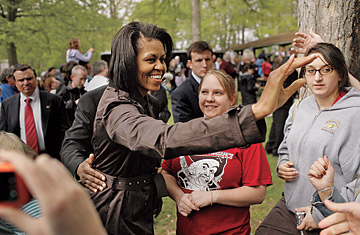
Michelle greets supporters after an Obama campaign appearance at a country picnic in Nobleville, IN.
(2 of 2)
When we talked, I wondered whether it really should be Michelle's responsibility to refute such biases. Michelle replied that she's used to it. "That has been my experience my whole life," she said. "That's why education is so important. That's why giving all kids a chance to go away to college is important. We grow up in our communities and our neighborhoods and our families, and we know what we know. It's no fault. It's no blame. But when people have a chance to interact and have conversations — you don't even have to live under the same roof. There are many people who went to college with me who got to see me and know me, and whether [or not] they knew me personally, they took away the experience. That's the nature of life when you're in the minority in most situations ... I feel like that's a role that I should play."
The fact that she has played it for so long helps to explain the apparent ease with which she has handled the intensity of the campaign. "When you're a person like me, who steps outside the normal boundaries of what their life is supposed to be like — say, going to Princeton — you're worried that maybe you're not prepared, because everybody has told you you probably won't be, and then you get there and you're like, I'm prepared." She laughed. "I think many of us are more prepared for certain situations than we imagine."
If the past 20 months have had their rough patches, what's surprising at this point is how unguarded Michelle still seems: the most endearing and entertaining parts of her public appearances are ad-libbed, whether she's bragging to a Denver audience that she's wearing sensible shoes (the member of her staff in particularly high heels that day was "going to be sorry in the end," Michelle joked) or referring to Barack, as she did at the convention's black caucus, as "this guy that I know, this man that I married," before mischievously adding, "his cute self." Anyone who doubts her off-the-cuff charm should Google the clip in which she's giving an outdoor speech and her dress flies up in the wind. Deftly catching it, she tells the audience, "I don't mean to flash you guys ... I'm not going to be on YouTube."
And this is Michelle Obama's greatest gift: her ability to relate to regular people, and vice versa. Even though she's taller and fitter and better educated than most of us, she is completely and totally believable as a person who lives in the same world we do, who consumes the same pop culture (Us Weekly, anyone?) and shops at the same stores (Target, Gap) and struggles with most if not all of the same personal and professional juggling acts.
Few political spouses in recent memory, and even fewer First Ladies, have seemed this familiar. Take, for example, Laura Bush. I'm a fan of our current First Lady, in large part because she comes across as a truly kind, decent person. Her combination of obvious intellectual curiosity, compassion and total discretion intrigues me — so much so that I decided that the next best thing to knowing what someone like her thinks and feels would be imagining it. But if Laura inspires my affection and sympathy, I don't exactly relate to her, or I relate only to certain elements of her story — her love of reading, her past as a Democrat — that stand out all the more because the rest of her life seems so foreign. She is of an older generation and has made choices, like quitting her job after getting married but before having children, that are the choices of another time. Michelle Obama, by contrast, had a higher income than her husband for part of their marriage.
And contrary to her claims, Michelle is not the first person of her kind I've seen; she's actually recognizable as a very particular type, though it took me until after the convention to figure out what that type is. I suspect this person will be familiar to anyone who has, in the past 25 years, been a young, college-educated woman in her first real job: you're, say, 22 and somewhat clueless, and you go to work in an office where there's a woman eight or 10 or 12 years older than you who's not only visibly good at her job but also confident and friendly and well-dressed and busy with a life that features a cute husband and a nice house and maybe even a couple of kids. And you think maybe, if everything goes right, your own life could turn out like hers.
Sittenfeld is the author of Prep and American Wife (Random House)
